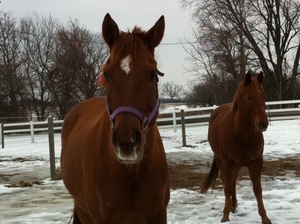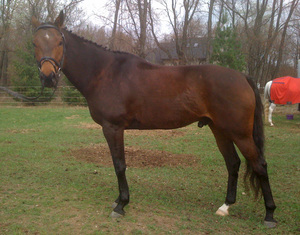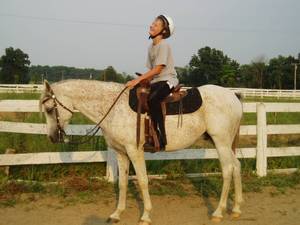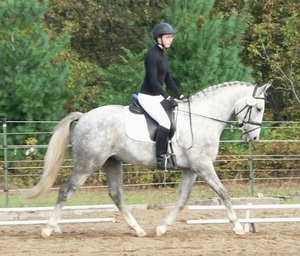Understanding horse personalities can help you bring out the best in each animal

Two chestnut colored horses with vastly different personalities.
Kathy Lundberg | Contributor
It is sometimes easy to think of animals — particularly those we are less familiar with — as having a single personality which is characteristic of their species. Not so! Horses, for example, each have distinct personalities, shaped by innate instinct, familial tendencies and learned experience, which are as unique as our own.
One useful way of categorizing horse personalities was popularized by Yvonne Barteau (Ride the Right Horse: Understanding the core equine personalities & how to work with them. Storey Publishing, 2007). Barteau outlines four different personality traits: aloof, social, fearful and challenging. An individual may exhibit a combination of traits, but often one or two primarily summarize an individual’s approach to life.
An aloof horse acts in a removed fashion, content in its own world. This horse is tolerant of outside influences such as riders’ cues. In the pasture, an aloof horse is content to hang around with its pasture mates but shows little interaction. Under saddle, an aloof horse is frequently referred to as unresponsive or, when properly trained, bomb-proof.

Tall, handsome and cool: An aloof Thoroughbred.
Kathy Lundberg | Contributor
A very social Welsh pony: fun, quick learner.
Photo by Jim Stafford, JSPhotography
More guarded and cautious, a fearful horse draws confidence from its rider or another horse with which it has bonded. Fearful horses generally occupy the lower rungs of social order. Wary of new situations, the fearful horse maybe described as “spooky” and overly-reactive. With training, a fearful horse will often make a strong effort to be brave, especially in the company of people or other horses with which it is comfortable.

This Arabian draws confidence from his rider.
Kathy Lundberg | Contributor
A challenging horse needs no extra confidence. They tend to be near if not top in the pecking order of their herds. They want to set their own pace or direction rather than follow their rider’s plan when being ridden. They have large “personal bubbles” that may overlap into their handler’s. Challenging horses have a strong drive to be the best, or strongest in their herd, even if it is a herd of two: horse and rider. However, for a rider it respects, a challenging horse is often a brave, charismatic partner and successful show horse.

This challenging Oldenburg gelding has agreed with the direction of his rider, with good result.
Photo Courtesy of Ruth Hill-Schorsch
Personalities often do not fall neatly into one category but show variations on the theme. Traits from two or more categories may be expressed. Age and experience can add complexity.
Why bother with trying to decipher your horse’s personality? Not all horses respond positively to the same training methods. Having an idea of basic personality types may help determine which approaches will be most effective. Beyond that, it is useful to anyone who interacts with horses to understand why they react differently to the same stimulus.
We tend to personify creatures, especially those with which we share a bond, portraying them in human terms. Remember that horses developed along a very different path from us primates. Their perceptions, motivations and reactions differ from ours, and are not necessarily "politically correct" in human terms.
Bullying, for example, is an accepted practice in horse herds. Horses are prey animals evolved to react quickly and decisively when presented with a problem: run away now, ask questions later. Thousands of years of selective breeding and careful training help them temper this instinct.
Humans have been both predator and prey in our history but certainly have been predators of horses. We may recognize behaviors and interactions that have human correlates, but horses view the world very differently than you or I and may react in an accordingly different manner. Horses are intelligent creatures in their way, with personalities as unique as fingerprints.
Kathy Lundberg is the owner of Scio Church Stables. Email her at scs@sciochurchstables.com.


Comments
ArgoC
Wed, Feb 23, 2011 : 10:21 p.m.
I learned something. Thanks!
julieswhimsies
Wed, Feb 23, 2011 : 10:16 p.m.
I guess you could say my registered American Paint, Sunny is social...without a doubt! I agree, though. There is a tendency with some people to be anthropomorphic with regard to their horse, or other pets. I have known many who refer to their horses as their children. Sometimes, IMHO, this is not always what is best for the horse.
A2K
Wed, Feb 23, 2011 : 5:13 p.m.
Great article! My dear old Morgan Gelding Wildkat was 100% a social horse - he'd test you once in awhile, but his chest would swell, his tail would wave like a banner, and he'd hold his head high to carry you wherever you wanted to go (be it ring, or around the pasture). He'd be 26 years old this year, I hope he's making someone happy somewhere :O)